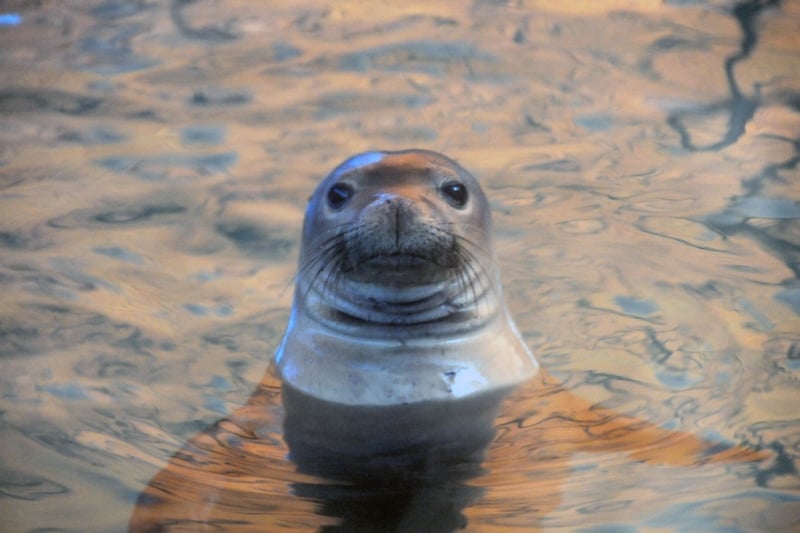
A farewell thank you to President Obama for his work to protect our oceans
News
U.S. Campaign Manager for Oceans and Wildlife Elizabeth Hogan highlights the impact President Obama's terms had on our oceans and the animals that call them home
As we bid farewell to President Obama, we would like to thank him for all he and his administration have done to protect the oceans. When President Obama leaves the White House, ocean wildlife will have a vastly safer habitat than it had eight years ago, and for this we thank him. Here are the many ways that the ocean is now better protected:
Together with Prime Minister Trudeau of Canada, President Obama protected the Chukchi and Beaufort Seas (and unilaterally an additional 3.8 million acres in the Atlantic Ocean) from risky offshore drilling. This not only protects vital habitat for marine species and prevents the risk of oil spills, it spares wildlife from multiple impacts of deadly blasts from seismic testing. Whales and dolphins rely on their hearing to find food, communicate, and reproduce. Hearing loss for these species leads to abandonment of habitat, disruption of mating and feeding, and even beach strandings and death. Seismic airgun testing proposed for the Atlantic would have injured 138,000 whales and dolphins, and disturbed millions more. President Obama and Prime Minister Trudeau designated 115 million acres of Arctic waters as indefinitely off limits to future offshore Arctic oil and gas licensing, to be reviewed every five years through a climate and marine science-based life-cycle assessment.
To the immense benefit of whales, dolphins, seals, and sea turtles around the world, the Obama Administration enacted a new rule requiring countries exporting seafood to the United States to demonstrate that their fisheries comply with the U.S. Marine Mammal Protection Act (MMPA). The United States is the world's largest seafood importer and the MMPA is among the world's strongest marine mammal protection laws; and most of the world's ∼125 marine mammal species are affected by fishing gear, often severely. For more information on marine wildlife entanglement, check out our Sea Change campaign.
Earlier this year, the Obama Administration passed the Seafood Import Monitoring Program, which will require tracking of imports of at-risk species (like sharks, shrimp, cod, tuna, and snapper) in order to prevent seafood fraud and illegal fishing (IUU). This rule will also help to cut down on overfishing by increasing transparency and traceability in our seafood supply chain.
Under the Obama Administration, NOAA Fisheries also released the “Ecosystem-based Fisheries Management Road Map,” a comprehensive, science-based plan that looks at the broader ecosystem when managing fisheries, rather than looking at one fish at a time. It’s a good step forward to help end overfishing and rebuild vulnerable stocks.
President Obama created the largest ecologically protected area on the planet in August 2016 when he expanded a national marine monument in Hawaii to encompass more than half a million square miles. The president more than quadrupled the size of the Papahanaumokuakea Marine National Monument to 582,578 square miles of land and sea in the Northwestern Hawaiian Islands.
In addition to creating the world’s largest marine sanctuary, the President also created the first marine monument in the Atlantic Ocean when he established the Northeast Canyons and Seamounts Marine National Monument in New England. He has protected more U.S. waters than any other president in history.
Globally, twenty-four countries including the United States collectively created the world’s largest marine reserve (twice the size of Texas) in the Antarctic’s Ross Sea. This essential, pristine habitat to whales, seals, penguins, and 16,000 other marine species, is the largest remaining marine wilderness on the planet, and this historical protective measure is due in large part to the efforts of Secretary of State John Kerry, who has been a dedicated ocean steward during his time in the United States Senate and serving in the Obama Administration.
To protect deep sea corals, the US banned bottom trawling in an area offshore of New York and New Jersey. This habitat off the east coast is the foundation of ocean ecosystems that support commercially valuable species, like mackerel and squid. Deep-sea corals provide a vital habitat for other marine life; they provide food and shelter for a variety of juvenile fish, sponges and anemones. The destruction of deep-sea corals can jeopardize the survival of many marine species, as well as the jobs that depend on them. Major US fish stocks that had been severely depleted have been rebuilt through strict, science-based catch limits based on scientific research.
Twenty-nine countries including the United States and the EU ratified the Port State Measures Agreement to cooperate on tracking and prosecuting illegal, unregulated, and unreported (IUU) fishing. The PSMA entered into force as an international treaty in June 2016. IUU fishing is estimated at a value of up to 23 billion USD, and it endangers the biodiversity and food security of many developing countries. The support of the US in ratifying the PSMA will deny illegal fishers access to markets around the world and drive the seafood industry toward greater sustainability. Boats that fish illegally will now have a much harder time bringing their catch into ports worldwide.
President Obama signed into law H.R. 1321, the Microbead-Free Waters Act of 2015. The bipartisan legislation will begin the phase out of plastic microbeads from personal care products. It is estimated that more than 8 trillion microbeads enter US aquatic habitats every day. Banning microbeads will protect water quality, wildlife and other resources. Some species of marine life mistake the plastic beads for food, causing ingestion of plastic which leads to starvation. And most of the plastics in cosmetics and personal care products contain non-degradable polymers that take hundreds of years to break down.
Thank you, President Obama! The oceans are healthier and safer for your efforts.